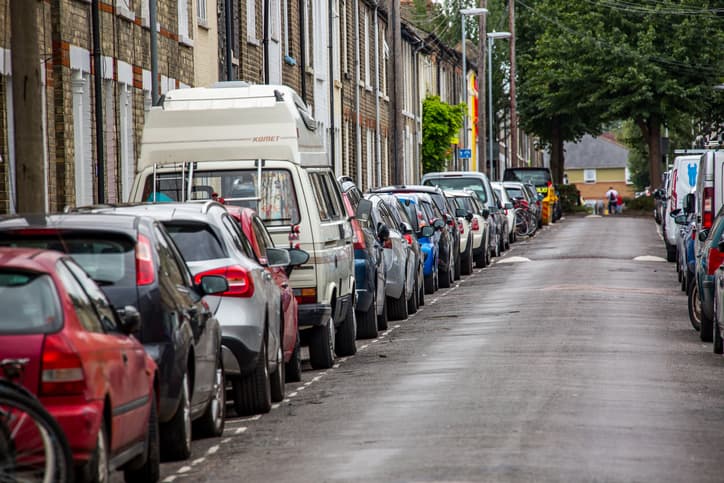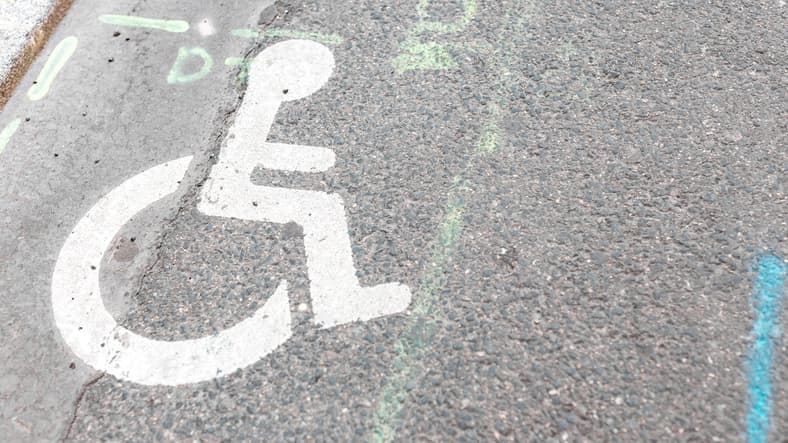Can I Stop People Parking Outside My House?
THE RULES AROUND STREET PARKING

When it comes to preventing people from parking outside your home, there is very little that you can do. In Ireland (as in most other countries), you simply can’t reserve the space directly outside your home to use as your own private parking space.
Any member of the public can park by the side of any public road so long as they don’t obstruct traffic or entrances and there are no local parking restrictions. Public roads are roads that are owned and maintained by local authorities (including those in housing estates), so anyone can park there.
According to the Rules of the Road, there are no restrictions on parking outside a home but “you must not park in any way which interferes with the normal flow of traffic, or which obstructs or endangers other road users”.
As a resident or home owner, you don’t own the footpath or roadway outside your property line and cannot prevent anyone else from parking there. If you are having problems with people parking outside your property, there may be some steps you can take and you can read about them here.
The Misconceptions About Street Parking
Most of us believe, or have believed at some point, that we automatically have parking rights outside our homes. We don’t. Parking in residential areas can cause issues with homeowners especially in towns and cities and in built up areas near sports venues, beaches, parks and train stations. You’ll often see traffic cones or wheelie bins placed outside houses by residents to stop other people from parking there. Many believe there is an ‘unwritten rule’ that says that’s their spot and nobody else’s. But this is not supported by any law, even if the resident has a parking permit.
What About Vans Parked Outside Your Home?
Is there a van parked outside your house? You might find it irritating but it’s perfectly legal. There are generally no restrictions on parking vans in residential areas, but some councils ban heavy goods vehicles over three tonnes on public roads – you’ll have to check with your own council if that’s the case on your road.
What If I'm Having Trouble Using My Driveway?
If someone has parked partially or fully across your driveway or entrance, then you have every right to complain. According to the Road Traffic (Traffic and Parking) Regulations 1997, Section 36 (2)(g), someone cannot park in a way that obstructs entrances. Specifically: “A vehicle shall not be parked in any place, position or manner that will result in the vehicle obstructing an entrance or an exit for vehicles to or from a premises, save with the consent of the occupier of such premises.“
Let’s say you live on a narrow road and cars are parked in front of your home and on the other side of the road and make it very difficult for you and any visitors to turn into your home from the road. The 1997 regulations prohibit people from parking in a way that their car causes an obstruction to a car entering or exiting a driveway. In this situation, it would be worth having a word with the driver of the parked car making it difficult to enter/leave your driveway and quote the regulations.
What About Residential Parking Permits?
In some areas, particularly in cities like Dublin, Cork, or Galway, you may apply to your local council for a parking permit for your street if there is paid parking. However, the permit does not gaurantee a space outside your home.
If You live On A Private Road
If you live on a private road, or a road maintained by a homeowners' association or management company, the rules might be different. The association may have the authority to enforce parking restrictions, so have a word with them.
What Can You Do If Parking Is An Issue Outside Your Home
If cars or vans parking right outside your house are really bothering you then don’t despair – there are still some things you can do to alleviate the situation. Here are a few options for you to consider:
- Have a word with the neighbours who park frequently in front of your house. A friendly chat will often do the trick.
- Do you think the car might have been abandoned? Then call your local council. The council may remove the car if they believe it has been abandoned – for example, if the car has been there a long time and the tax disc is out of date.
- Request a paid parking scheme: If parking is a significant issue, residents can request a paid parking scheme through the local council. This is usually done through a resident association or a group of residents.
- Park your car on the road in front of your house and leave your driveway empty – there’s nothing wrong or illegal with that. There is a downside to this, however, as your car is more likely to get bumped or scratched while parked on the road. It might also cause a problem with your car insurance if you want to make a claim and you told your insurer that your car was always parked on your driveway.
- Have you thought about turning your front garden into a parking space? Keep in mind that this usually needs planning permission from the council.
- If you or a family member has mobility difficulties and there’s no off-street parking in front of your home, you could apply for a designated disabled parking spot. You can apply for one through your local council and they’ll appraise it according to their criteria.

Illegally Parked Cars And Vans
If the car outside your home has been parked illegally, then give your local county council a ring and let them know about it. Bear in mind that if it’s illegal for others to park there and you can’t park there either.
WHEN IS IT ILLEGAL TO PARK?
Here are some of the most common scenarios where parking is prohibited:
- Along a road with a single yellow line (during indicated hours) or double yellow lines – if you’re unsure what markings mean what, check this blog out.
- On zig-zag road markings (usually yellow outside a school, or white at a pedestrian crossing).
- At the side of a road that has a single white lane down the middle and/or a ‘No Overtaking’ sign.
- Where there is a ‘No Parking’ sign.
- Where there is a restricted ‘Parking’ sign, outside of the times shown.
- On a clearway.
- In a cycle lane.
- In a contra-flow bus lane at any time or in a ‘with-flow’ bus lane.
- In a bus-stop, taxi rank or loading bay.
- In a tram lane or on tram tracks.
- On a pedestrian-only street.
- On a footpath, grass verge or median (the space between two carriageways), even if this is right outside your house or business.
- In a designated disabled parking spot without a permit.
- Anywhere on a motorway, including the hard shoulder.
- 15 metres before, or five metres after, a pedestrian crossing or traffic lights.
- Within five meters of a road junction or school entrance.
- Anywhere that affects the entrance to or exit from a fire station, ambulance station or Garda station.
- Blocking or partially blocking an entrance to a premises/driveway, unless the owner has consented.
- In a way that obstructs emergency vehicles.
- At corners, bends or the brow of a hill.
We hope we have clarified the rules in relation to parking outside your home. In summary, you cannot prevent people from parking outside your home on a public road. But if they are blocking your driveway (either fully or partially) or if they are parked illegally, you can report the issue to your local authority.

